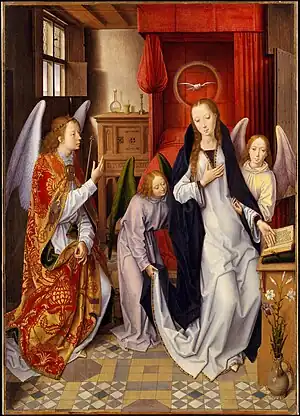|
THE SAINTS PORTAL
Showcased saint-related content St Bridget of Sweden pictured with a halo. In Christian iconography, saints may also be depicted with wreaths, palm branches, and white lilies. In Christian belief, a saint is a person who is recognized as having an exceptional degree of holiness, likeness, or closeness to God. However, the use of the term saint depends on the context and denomination. In Catholic, Eastern Orthodox, Anglican, Oriental Orthodox, and Lutheran doctrine, all of their faithful deceased in Heaven are considered to be saints, but some are considered worthy of greater honor or emulation. Official ecclesiastical recognition, and consequently a public cult of veneration, is conferred on some denominational saints through the process of canonization in the Catholic Church or glorification in the Eastern Orthodox Church after their approval. While the English word saint originated in Christianity, historians of religion tend to use the appellation "in a more general way to refer to the state of special holiness that many religions attribute to certain people", referring to the Jewish ḥasīd or tzadik, the Islamic walī, the Hindu rishi or Sikh Bhagat and guru, the Shintoist kami, the Taoist shengren, and the Buddhist arhat or bodhisattva also as saints. Depending on the religion, saints are recognized either by official ecclesiastical declaration, as in the Catholic faith, or by popular acclamation (see folk saint). (Full article...) Selected biographySaint Procula, Pontius Pilate's wife, is unnamed in the New Testament, where she appears a single time in the Gospel of Matthew. Alternate Christian traditions named her, Proculla, Procla, Prokla, Procle or Claudia. Also combinations like Claudia Procles or Claudia Procula are used. No verifiable biography exists on the life of Pilate’s wife. Details of her life are surmised from Christian legend and tradition. In the New Testament, the only reference to Pilate’s wife exists in a single sentence by Matthew. According to the Gospel of Matthew 27:19, she sent a message to her husband asking him not to condemn Jesus Christ to death: ‘While Pilate was sitting in the judgment hall, his wife sent him a message: “Have nothing to do with that innocent man, because in a dream last night, I suffered much on account of him.” Procula (Procla, Prokla) is recognized as a saint in two churches within the Eastern Christian tradition: the Eastern Orthodox Church and the Ethiopian Orthodox Church. In the Eastern Orthodox Church, she is celebrated on 27 October. The Ethiopian Orthodox Church celebrates Pilate and Procula together on 25 June. Did you know...
Selected saint days
General imagesThe following are images from various saint-related articles on Wikipedia.
Categories Saints Saints by nationality Saints by religion African saints Saints in art Cross-dressing saints Dalit saints Female saints Middle Eastern saints Lists of places named after saints Reliquaries Spiritual teachers Saint stubs Related portalsWikiProjects
The Saints Wikiproject aims primarily at standardizing the articles about people venerated by some Christians as saints or the blessed and ensuring quality articles. If there is an interest in including saints from religions other than Christianity, please propose those changes on our talk page. Related topicsSaints: Saint Michael - Saint Gabriel - Virgin Mary - Saint Joseph - Saint John the Baptist - Saint Stephen - Saint Peter - Saint Paul - Saint Augustine of Hippo  Traditions: Calendar of saints - Hagiography - List of saints - Symbology of the Saints Theology: Communion of Saints - Intercession of saints - Martyrs - Patron saint Roman Catholicism: Congregation for the Causes of Saints - Servant of God - Venerable - Beatification - Canonization Muslim Sufi saints: 'Abd al-Qadir al-Jilani - Ahmad al-Rifa'i - Ibrahim al-Disuqi - Ahmad al-Badawi - Al-Shadhili - Baha' al-Din Naqshband - Ibn 'Arabi - Wali Sanga Recognized content
Featured articlesGood articles
Featured pictures
Former featured pictures
Things to do
Associated WikimediaThe following Wikimedia Foundation sister projects provide more on this subject:
Discover Wikipedia using portals
|





















_-_Dome.jpg.webp)
_-_Google_Art_Project.jpg.webp)
.jpg.webp)


